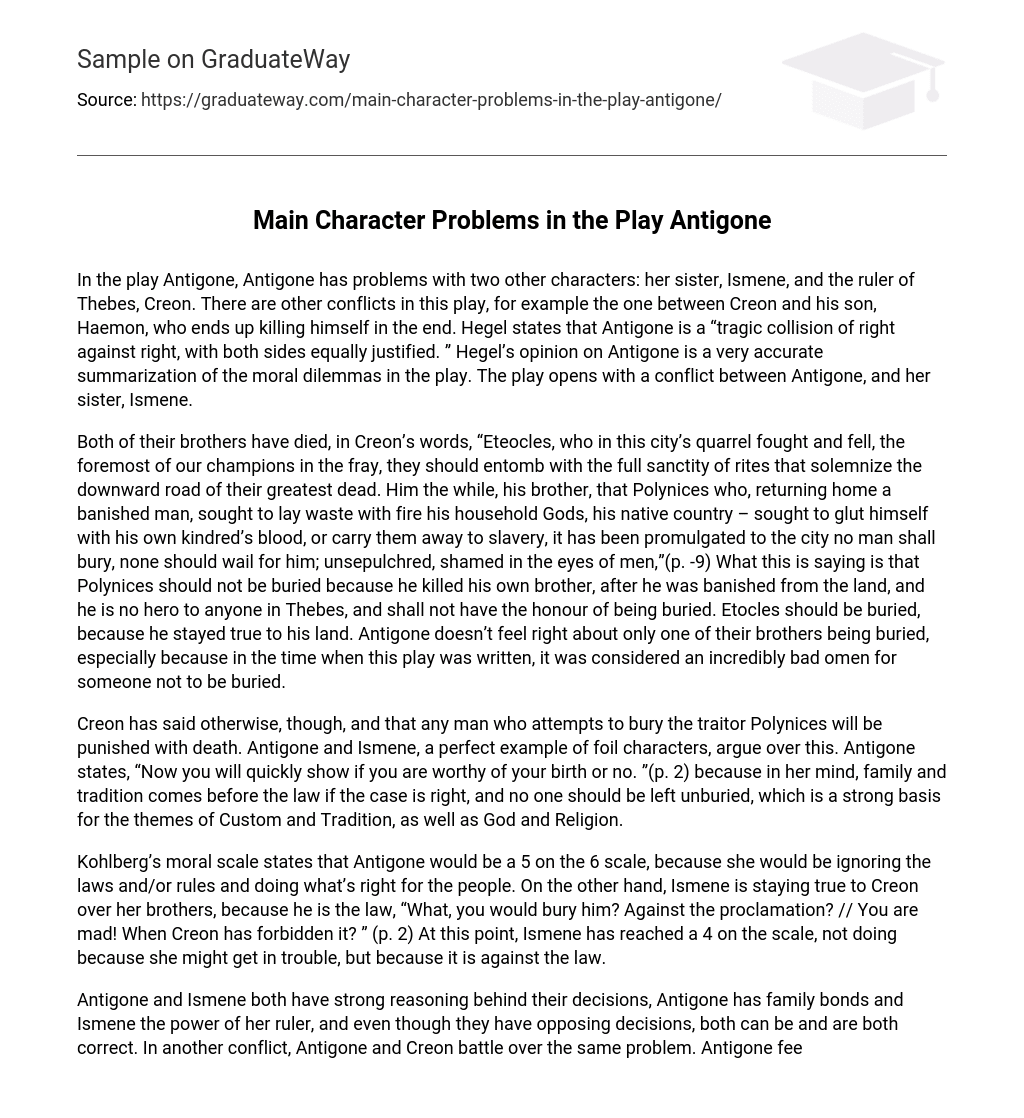Antigone in the play faces issues with two other characters: Ismene, her sister, and Creon, the ruler of Thebes. Apart from this, there exist other conflicts as well, like the one between Creon and his son, Haemon, who eventually takes his own life. Hegel asserts that Antigone represents a “tragic collision of right against right, with both sides equally justified.” Hegel’s viewpoint on Antigone accurately summarizes the moral dilemmas portrayed in the play. The opening of the play revolves around a conflict between Antigone and Ismene.
According to Creon, both Eteocles and Polynices have died. Eteocles, who fought for the city and died in battle, should be buried with the appropriate rites. However, Polynices, who returned as an exile and sought to destroy his homeland and family, shall not be buried or mourned. He will remain unburied and dishonored. The reason for this decision is that Polynices is a murderer and does not deserve the honor of a burial. Antigone, on the other hand, disagrees with this decision and believes that both brothers should be buried. In that time, not being buried was seen as a terrible omen.
According to Creon, any man who tries to bury Polynices, the traitor, will be punished with death. Antigone and Ismene, who are perfect foils characters, argue about this matter. Antigone believes that it is important to prioritize family and tradition over the law if the situation is right. She states, “Now you will quickly show if you are worthy of your birth or no.” (p. 2) This belief forms a strong foundation for the themes of Custom and Tradition, as well as God and Religion.
According to Kohlberg’s moral scale, Antigone would be rated as a 5 out of 6 because she prioritizes doing what is right for the people, even if it means disregarding laws or rules. On the other hand, Ismene remains loyal to Creon instead of her brothers, as he represents the law. Ismene’s adherence to Creon’s authority is demonstrated when she says, “What, you would bury him? Against the proclamation? // You are mad! When Creon has forbidden it?” (p. 2). This indicates that Ismene ranks at a 4 on the scale, choosing not to act based on potential consequences and instead following the law.
Both Antigone and Ismene have valid reasons for their decisions. Antigone is driven by familial ties, while Ismene is motivated by loyalty to her ruler. Despite their opposing views, both are justified in their beliefs. Another conflict arises between Antigone and Creon, as they clash over the same issue. Antigone remains steadfast in her position, just as she did in her dispute with her sister. Creon, on the other hand, aligns himself with Ismene but lacks the same logical rationale. Refusing to bury Polynices, Creon prioritizes the opinions of the citizens of Thebes and uses this situation to portray himself as a strong and independent ruler. Hegel’s statement accurately describes this tale. Tragically, the play concludes with the deaths of Antigone, Haemon, and Eurydice. The entire play serves as an epic battle between different perspectives of what is right. Even unmentioned conflicts like the father-son fight between Haemon and Creon contribute to this narrative. Ultimately, death is the only resolution to these quarrels. On Kohlberg’s scale of moral development, Antigone and Haemon rank at a level 5-6, while Creon and Ismene reach a maximum of level 4. Each character is right in their own way due to their individual motivations.Creon, Ismene, and Antigone prioritize themselves and their relationships with others above all else. Regardless of the person involved, Antigone would make the same sacrifice. Hegel’s statement remains true.
The tragic section revolves around the deaths of three loved ones and the exploration of a clash between different perspectives on what is right. Antigone, Haemon, Creon, and Ismene all present valid arguments, albeit with varying “moral levels”. Does this imply that one individual can be more morally righteous than the others? Unfortunately, answering this question is not as straightforward as solving a math problem where two plus two always equals four. In the battle of conflicting moralities, a definitive resolution will never exist; it ultimately hinges on the viewpoint of the reader or audience in this case. As we are aware, opinions can always diverge.





